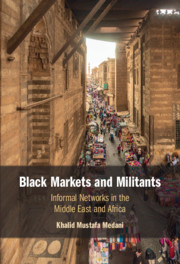Book contents
- Black Markets and Militants
- Black Markets and Militants
- Copyright page
- Dedication
- Contents
- Figures
- Tables
- Acknowledgments
- Preface
- I The Framework
- II The Institutional Context in an Era of Abundance
- 1 “The House the Boom Built”: The Informal Economy and Islamist Politics in Egypt
- 2 Investing in Islamism: Labor Remittances, Islamic Banking, and the Rise of Political Islam in Sudan
- 3 Islamic versus Clan Networks: Labor Remittances, Hawwala Banking, and the Predatory State in Somalia
- III Globalization and Institutional Change in an Era of Scarcity
- Book part
- Notes
- Bibliography
- Index
3 - Islamic versus Clan Networks: Labor Remittances, Hawwala Banking, and the Predatory State in Somalia
from II - The Institutional Context in an Era of Abundance
- Black Markets and Militants
- Black Markets and Militants
- Copyright page
- Dedication
- Contents
- Figures
- Tables
- Acknowledgments
- Preface
- I The Framework
- II The Institutional Context in an Era of Abundance
- 1 “The House the Boom Built”: The Informal Economy and Islamist Politics in Egypt
- 2 Investing in Islamism: Labor Remittances, Islamic Banking, and the Rise of Political Islam in Sudan
- 3 Islamic versus Clan Networks: Labor Remittances, Hawwala Banking, and the Predatory State in Somalia
- III Globalization and Institutional Change in an Era of Scarcity
- Book part
- Notes
- Bibliography
- Index
Summary
In Somalia the boom in labor remittances inflows fueled a different type of informal economy. More specifically, while the oil boom period reduced the Somali state’s ability to regulate the economy as in Egypt and Sudan, the consequences of this development differed. In Somalia informal financial networks facilitated a thriving commercial sector comprised of firms oriented around clan families. It was not religious or class affiliations, but rather ethnic mobilization and conflict that became the most salient. This difference was due to two factors: the dearth of formally organized institutions (i.e., official banks, and publicly registered enterprises); and the fact that President Siad Barre pitted one clan against another in his search for legitimacy and financed a patronage system excluding clans and constituencies that opposed his rule. Thus, with the expansion of the parallel economy, the politics of ethnicity and personalistic networks quickly eclipsed the power of the state.
Keywords
- Type
- Chapter
- Information
- Black Markets and MilitantsInformal Networks in the Middle East and Africa, pp. 128 - 150Publisher: Cambridge University PressPrint publication year: 2021

